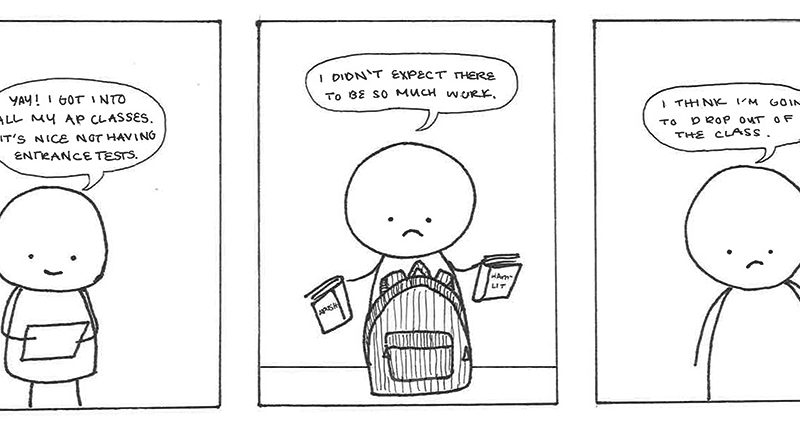AP classes should have entrance requirements
The majority of AP classes have entrance requirements students must meet to enter. Recently teachers decided that APUSH (AP US History) would no longer require a written test, just a multiple choice exam, and AP English classes won’t be having any requirements at all.
We at The Olympian believe that the entrance requirements should remain in place.
Entrance tests and other requirements are great indicators of the work students are willing to put into a class that will really take a lot from them. If you can’t even pass an entrance test, then it shows you are not prepared for the extensive energy needed in the classes.
The changes would make the AP classes more accessible, but AP classes are meant for people who are above the regular standards and not just the everyday average student looking for an easy way to get college credit.
There are already a large number of kids dropping out of these classes in the first quarter. By admitting students who don’t want to put in the work will likely lead to even more students dropping out since they aren’t well suited for the work being asked of them.
Some teachers may enjoy the thought of not having to grade an extensive amount of entrance tests, but they will have teach, grade and deal with students who aren’t well suited to their classes. The Olympian suggests that if the teachers change these requirements, then they do it in a certain way. They should weigh a letter of recommendation heavier than the test, since a test alone doesn’t show the work you’re willing to put in.
Teachers should keep the entrance tests in place since having no writing requirements for classes heavy on writing doesn’t benefit anyone in the end.


I agree that the decision to eliminate AP entrance exams was well-meaning but ill-advised. The school made the decision in order to increase opportunity for underprivileged students, as well as furthering the “All means all” mission. While the decision did do this, it also resulted in a high percentage of students struggling in or dropping out of hard classes. In order to make rigorous learning more inclusive, the school should provide more assistance to those who are struggling early rather than dismissing their interests and later admitting them into challenging classes. Some teachers put students who show little interest in learning on their “bad side” when they should instead recognize they may have circumstances beyond control and need help. That being said, I agree that recommendations should be weighted equally to or more than entrance exams.
The argument to revive entrance exams might be strengthened by a comparison of statistics of drop-outs with and without entrance exams, if such statistics are available.